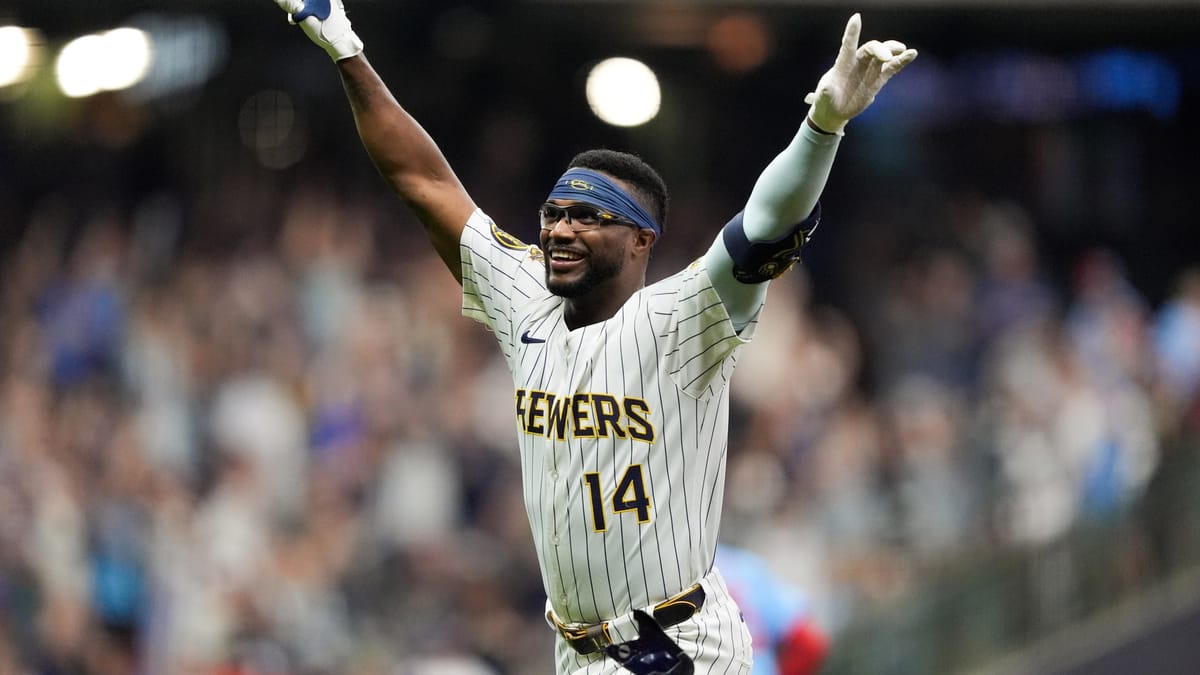The 2025 Milwaukee Brewers
And some thoughts on embracing the sustainable process rather than chasing the easy answers

At the time of writing, the Milwaukee Brewers have the best record in MLB. Let me rephrase this for emphasis: With just a handful of series left in the 2025 season, there exist twenty nine other big league teams with fewer wins than the Brewers. Accepting this reality has been exhilarating and shocking, perhaps establishing a new high-water mark of my fandom for this team in my life. Having grown up with the disappointing seasons of the aughts and the "not quite there" years of the early-mid teens, the thought of the Brewers achieving at this level has largely remained but only a foolish hope in my mind. Despite being perennially overlooked by the larger baseball media apparatus, the beermen are cruising to their fourth division title since 2021, underscoring their dominance in recent years of an admittedly lean NL Central.
The obvious followup to this factoid is to investigate the Brewers' recent playoff success on the back of all these solid seasons, which quickly reveals an unimpressive history of being unable to follow through when it really "matters." Many might stop reading here, throwing up their hands as if to say "later losers, call me when you actually win a playoff series." While this is a valid criticism, I ask you readers to bear with me for a moment, and consider a different way of thinking. Let us reframe our perspective and center the idea that the journey is the destination, that a hard days' work is its own reward.
Baseball is an interesting beast. More than any of the other large North American sports, baseball is best analyzed not in particular moments but along larger statistical trends. This is not to say that any individual play in a 162-game season doesn't matter, or that stats aren't useful for understanding your quarterback's ability. Baseball differs in that it's almost required to collect a massive, statistically significant dataset before you can really begin to dissect your favorite teams or players. This thought is characterized well by a comparison I remember hearing years ago: In a seven game NBA playoff series, the team with the higher true talent level will win the series something like 85 percent of the time. This is an indicator that the playoff series is an effective tool at sorting out the best teams available. In order to achieve the same proportion of outcomes in baseball, the playoff series would need to be on the order of 50 games, or some other number that is logistically impossible to implement. There is a reason the baseball season lasts for literally half of the calendar year - you need a lot of games to determine the best teams!
Given this understanding, should it not be the case then that we reward and incentivize longterm success in the sport? Is having the best hitting and pitching talent (and some luck with variance) to win a short baseball tournament really the way we should define the "best" team? What is to be said for the organizations who maintain the depth to achieve the most success integrated across the injuries, slumps and streaks of the full season? It's not unheard of to award a team for the best regular season record, either. In the European football leagues, for example, this is among the highest honors a club can achieve. Even for a large part of MLB history, the World Series was the entire extent of the postseason, pitting the teams with the highest regular season record in each league against one another.
Obviously the modern playoff format (and continued expansion of the tournament) has completely changed the landscape, and it is never going back. Baseball organizations have responded accordingly in how they build teams and manage them in the postseason. With more rounds to navigate, naturally a team has to min/max every available moment in a playoff game to give themselves the best odds of advancing. An emphasis is placed on players who can shut down lineups and hit game-shifting home runs (the juiced baseball helps also provides an edge here) as individuals. While these kinds of performances continue to be spectacular, I believe it detracts from the large-scale organization work which goes into constructing a cohesive and effective ballclub which is ultimately meant to work together.
When building a baseball team, one of the best tools you have at your disposal is money to pay for good players. It is far from their only useful strategy, but the Los Angeles Dodgers exemplify this very well. Year after year they can bring in big name free agents and add to their already massive payroll. Like any other MLB team (the owner-capitalists aren't your friend), the Brewers can and should spend more on their roster. For one reason or another, they choose to field Isaac Collins and Caleb Durbin on opening day instead.
Despite the active roster almost always seeming to be patched together by Some Guys, the Brewers continue to find success because of their investments in quieter, less flashy means. The front office has been drafting and trading for many of the everyday players we see now (Turang, Frelick, Collins, my sweetie my goat Blake Perkins, Ortiz). The pitching lab continues to work its magic turning Colin Rea into a reasonable innings eater and Quinn Priester into a legitimate top-of-rotation arm. The international development complex has turned out stars like Peralta, Chourio and Made. These marginal improvements in summation have given the Brewers a relatively sustainable model of generating talent and maintaining success. To me, this approach of doing the little things well and letting them add up stands in contrast to the "just buy your way out of your problems" mindset which seems to have deeply infiltrated the Yank psyche.
The philosophy of my hometown ballclub is one that I believe suits baseball well, and is one that I have attempted to mirror in my own personal life. While perhaps not the most straightforward or convenient way to achieve greatness, I like to see it as the most satisfying way. I have spent lots of time - probably too much, actually - trying to break my goals down into their simplest steps and ask myself why I am doing what I do. I am trying my best to pay attention to whatever the equivalent of catcher defense and baserunning aggression is in my life, rather than selling out for dingers every time. I suppose the hope is that one day, all of the discipline I have exercised with small things will begin to bear fruit, giving me plenty of bites at life's proverbial apple.
As we gear up for yet another postseason, I hold lots of optimism for the Brewers and their chances, despite their track record. I believe Milwaukee is capable of at least one series win in 2025, thanks to the prophecy that requires we lose the NLCS in heartbreaking fashion every seven years. In 2011 it was the Cardinals, in 2018 the Dodgers; it's simple math here folks - we're due. If anything gives me hope that the Brewers can take it even further this year, it's the fact that I will be out of the country and unable to celebrate a hypothetical championship among likeminded fans. This would be a devastating and cruel trick by the universe, and therefore seems fairly likely.
The Brewers will not always be this good; all things are fleeting, we must accept this. There will come a time (hopefully not too soon) where they are no longer atop their division, and they still may never actually fly a World Series pennant in Miller Park. But this season - representing the culmination of years working towards a sustainable and self-assured vision - is its own reward worth celebrating. Go Crew 🍻




